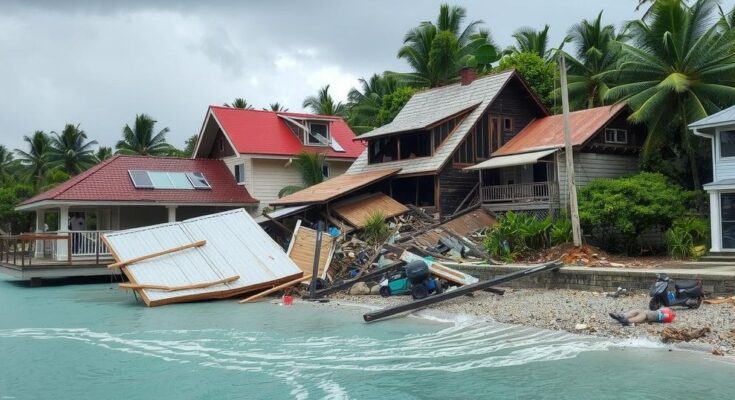Cyclone Chido has caused significant devastation in Mayotte, leading to at least 11 confirmed deaths and extensive injuries. With infrastructure severely compromised, rescue efforts are challenged as emergency services work to assess the situation. Cyclone impacts extend to Mozambique, raising the risk for millions in surrounding regions. International aid is being mobilized to assist afflicted populations.
The French overseas territory of Mayotte is facing grave concerns regarding a rising death toll following the devastating impact of Cyclone Chido over the recent weekend. Cyclone Chido has reportedly claimed at least 11 lives, with some provisional reports indicating as many as 14 fatalities. The difficulties in obtaining an accurate count of casualties are compounded by the cyclone’s extensive destruction, leading to a further escalation in the number of injured individuals, currently totaling 246, with nine in critical condition.
French Interior Minister Bruno Retailleau confirmed his imminent visit to Mayotte, accompanied by 160 additional soldiers and firefighters, to support the existing rescue efforts already underway. This catastrophic cyclone originated in the southeastern Indian Ocean and adversely affected surrounding areas, including Comoros and Madagascar. The prefect of Mayotte has characterized this event as the worst cyclone to hit the territory in nearly a century.
As Cyclone Chido advances, it has made landfall in Mozambique, raising alarms over the potential impact on approximately 2.5 million individuals across two northern provinces. Authorities have initiated an urgent mobilization of rescue teams and supplies via air and sea. However, these operations are severely hampered by infrastructural damage, particularly to airports and the region’s already precarious supply of clean drinking water.
In preparation for the cyclone, Mayotte’s 320,000 citizens were placed under lockdown. The cyclone’s powerful winds exceeded 226 kilometers per hour, leading to the complete destruction of numerous makeshift settlements that house a significant portion of the population. The local government expressed fears of an extensive death toll, stating that it would take several days to provide a comprehensive assessment of the situation.
Further exacerbating the crisis, more than 15,000 residences in Mayotte are currently without electricity, and disruptions in telecommunications make emergency communication exceedingly difficult. Damage reports from the Pamandzi airport indicate severe compromised infrastructure, while the overall health system of Mayotte has experienced significant setbacks, including major damage to the local hospital center.
Although the Comoros islands to the northwest have also endured impacts from Cyclone Chido, the damage has been relatively less severe. UN agencies, including UNICEF, have deployed aid to assist affected populations, ensuring the continuity of essential services amidst widespread destruction. Experts attribute the cyclone’s intensified forces to global climate change effects, underlining the growing frequency of such storms. Meteorological assessments suggest Cyclone Chido bears similarities to previous cyclones that claimed numerous lives and widespread devastation in the region.
The UN Office for the Coordination of Humanitarian Affairs has alerted that 1.7 million individuals could face threats from the cyclone, with forecasts of significant rainfall potentially causing flash floods in neighboring countries such as Malawi, Zimbabwe, and Zambia.
Cyclone Chido has emerged as one of the most significant weather events experienced by Mayotte, a French overseas territory situated in the Indian Ocean. The cyclone has developed in a region where warm ocean waters often fuel severe weather phenomena, accentuating the devastating effects of climate change on natural disasters. Historical data indicates that such intense cyclones can lead to significant loss of life and infrastructure damage, particularly in vulnerable regions with limited resources and emergency response capabilities. The immediate aftermath of Cyclone Chido reveals not only the environmental challenges presented by climate change but also the humanitarian crises that follow in its wake, necessitating a coordinated response from local and international authorities.
In conclusion, Cyclone Chido has led to a catastrophic situation in Mayotte, with a tragic loss of life and extensive infrastructural damage. The challenges in accurately assessing the death toll and injuries underscore the cyclone’s severe impact. As emergency services mobilize to address immediate humanitarian needs, the incident highlights the urgent need for enhanced resilience to climate-induced disasters and a coordinated global response to mitigating their effects.
Original Source: www.lemonde.fr




